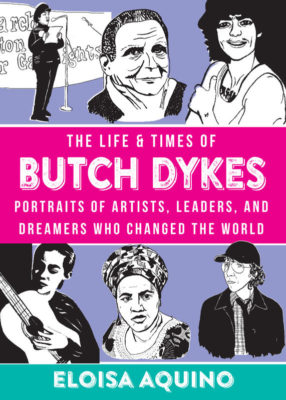Queer zine culture has a long history of creating and preserving the legacies of lives in the margins of cis, white, patriarchal society, oppressed and often undervalued in their time. One facet of queer culture that has remained underrepresented within zines is that of biographical content. This is where The Life and Times of Butch Dykes, a collection of Eloisa Aquino’s beloved and award-winning biographical zines, comes bursting forth in all of its daring and joyful glory. This hardcover collection profiles acclaimed figures such as Audre Lorde, Gladys Bentley, and Gertrude Stein, as well as more obscure artists (wait till you find out who created the boom mic!). In two-tone light pink and maroon with black linework, these vignettes artistically chronicle the lives of butch women and non-binary people who have made history.
Aquino, a trailblazer in her own right, understands how to synthesize other people’s stories with conscious grace. Each chapter contains detailed glances into the routines, personalities, and idiosyncrasies of its subject while simultaneously covering their whole lifespan, all in eight to ten pages. It’s a style of biography that is both intimate and global, giving you the scope of someone’s accomplishments while never diminishing their humanity. She has a knack for pacing and humour, effortlessly pulling off dramatic tonal shifts: in Chavela Vargas’s chapter, she writes, “First public woman in Mexico to wear pants. First to declare not to like men. First to own a Jaguar E Type. That didn’t last long. She almost died.” The next page shows a car wrapped around a tree.

The Life and Times of Butch Dykes
Portraits of Artists, Leaders, and Dreamers Who Changed the World
Eloisa Aquino
Microcosm Publishing
$25.99
paper
256pp
9781621062288
Nevertheless, her economy of language is incredibly effective, as is the succinctness of her linework, creating a sense of cohesion that’s impressive considering that the first Butch Dykes zine is twenty years old by this point. These gestural drawings, often recreations of iconic photographs, somehow capture the essence of the person even more than the originals Aquino reimagines.
The book’s introduction addresses the use of the term butch and some of its failings. Describing it as “[showcasing] beautifully that gender is fluid; our identities can shift subtly or dramatically throughout our lives,” the publisher provides important context and dimensionality to some of the problematic elements of identifying people with titles that they may not necessarily have claimed, allowing the rest of the book to serve as an informative celebration of groundbreaking people, without needing to asterisk every other page.
I found myself moved by The Life and Times of Butch Dykes’s endpapers: a grid of every person profiled in silhouette. This book features stories of queer icons who were not always as appreciated in their lifetimes as they should have been, stories of people we should have learned about in school, stories of people who defied society’s expectations and cleared paths for those who came after them. In these pages, Aquino brings them out of silhouette. The preservation of history that queer zine-making achieves creates solidarity within the community, a sense of hope and belonging, a validation of a world you know is there. Aquino’s The Life and Times of Butch Dykes should be mandatory reading, a queer textbook created with the striking, exuberant confidence that befits its history-making subjects. mRb






0 Comments